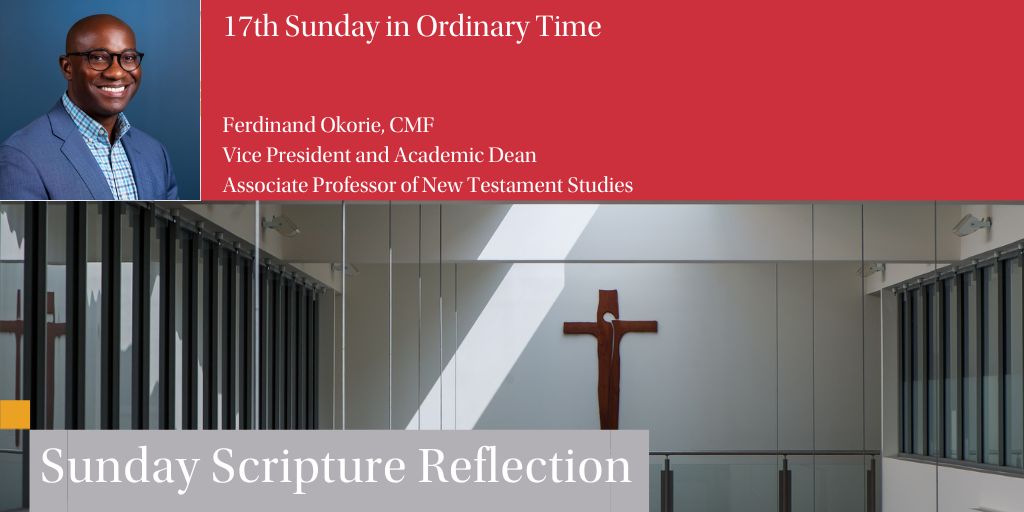

Readings:
Genesis 18:20-32
Psalm 138:1-2, 2-3, 6-7, 7-8
Colossians 2:12-14
Luke 11:1-13
I’ve keenly followed the altruistic activities of individuals and groups who go above and beyond to provide basic human needs to those displaced by war, environmental disasters, and to those in remote villages and settlements cut off from the basic benefits of modern society. In fact, the measure of their self-giving to the most vulnerable and often neglected human family is sublime. Their activities call our attention to the plight and dire conditions of the needy population in our midst, pulling us into working together to alleviate the suffering of the victims of war, environmental disasters, and those completely cut off from modernity. I have witnessed the resolve with which people donate school supplies and sports equipment to children in camps across war-torn regions of the world. Also, I’ve witnessed medical personnels provide free medical services and supplies to crowded camps with very little hygiene. I’ve watched volunteers deliver essential supplies to victims of flood, and other environmental disasters. This Sunday’s readings remind me of the value of compassionate and selfless service to benefit others towards a favorable outcome in their lives.
In the first reading, Abraham showed a deep concern for the wellbeing of the few good people of Sodom and Gomorrah as God is determined to rain down divine wrath on the twin cities. But Abraham’s concern for the few good people of Sodom and Gomorrah meets the compassion of God who pledged to spare the cities with just ten righteous inhabitants (Gen 18:32). God did not only listen, God showed compassion and willingness to forgive the inhabitants of Sodom and Gomorrah with just a few righteous ones. In other words, a few righteous ones can bring about the experience of divine mercy to the entire people of Sodom and Gomorrah. Just as Abraham interceded on behalf of the righteous ones in Sodom and Gomorrah, so also the good deeds of the righteous ones could bring about the saving gifts of God to their cities. By pledging to spare the cities for the sake of at least ten righteous ones, God discloses a divine disposition to collaborate with humankind for their wellbeing. This divine-human collaboration finds support in the words of St. Paul when he revealed that God is appealing through us to reconcile the world because we are ambassadors of Christ (2 Cor 5:20).
The plan of God to reconcile the world was perfected in the life and ministry of Jesus Christ. Through his willingness to die on the cross, Christ brings salvation to humanity as we read in the second reading (Col 2:12). Jesus becomes the source of life for believers because Jesus’ mediation gives believers the opportunity to return to the path of right relationship with God. Through participation in the baptismal ritual believers experience dying and rising with Christ in order to have life with God (Col 2:12). Through this means, Christ reunited us with God, and reestablished our bond of unity with God.
Just as Abraham in the first reading, and Jesus in the second reading, likewise our actions should give others an opportunity to experience wellbeing and comfort. Through our care and support of our loved ones by doing everything possible for their wellbeing. And doing so in a manner that our concern and care for them become an experience in human dignity and respect. Through friendship we connect with the humanity of one another in mutual appreciation, support, comfort, and honor.
Today, we are witnessing the extent that war and environmental disasters threaten food productions, and human life. Also, the policies of government around the world jeopardize economic growth and equality. Consequently, many people today in our community, nation and around the world lack a decent and an affordable lifestyle. Today, many families are dangerously sliding into abject poverty, and children are living in squalid and unhealthy conditions, even in advanced nations. The high rate of migration into the global north and the growing number of internally displaced people around the world present a painful picture of human need and deprivation.
But the readings for this Sunday invite us to look out for the good of one another, and be willing to support one another in nobility and human flourishing. St. Paul reminds us of the richness of God’s blessings (2 Cor 9:10-13) because God responds generously to our request for bodily nourishment and spiritual wellbeing (Luke 11:13). Therefore, let us respond to the needs of one another in solidarity, dignity and love with the blessings God has given to us.
Ferdinand Okorie, CMF
Vice President and Academic Dean
Associate Professor of New Testament Studies